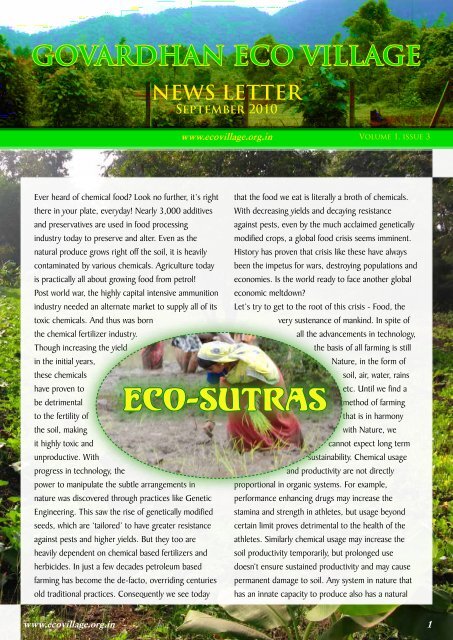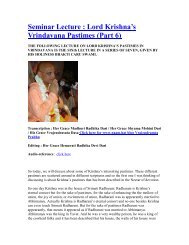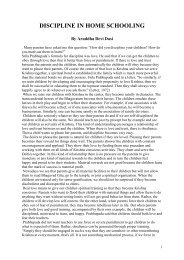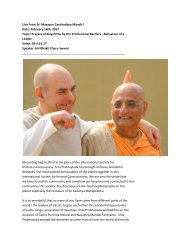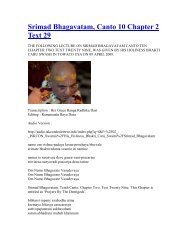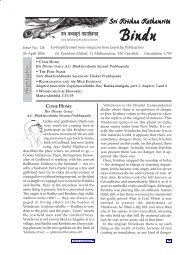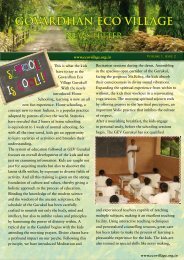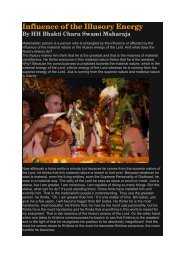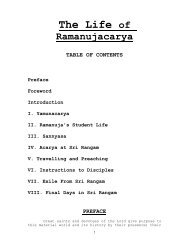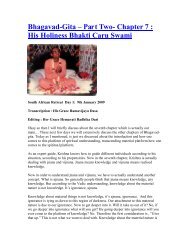Govardhan Eco Village Newsletter - ebooks - ISKCON desire tree
Govardhan Eco Village Newsletter - ebooks - ISKCON desire tree
Govardhan Eco Village Newsletter - ebooks - ISKCON desire tree
You also want an ePaper? Increase the reach of your titles
YUMPU automatically turns print PDFs into web optimized ePapers that Google loves.
GOVARDHAN ECO VILLAGE<br />
Ever heard of chemical food? Look no further, it’s right<br />
there in your plate, everyday! Nearly 3,000 additives<br />
and preservatives are used in food processing<br />
industry today to preserve and alter. Even as the<br />
natural produce grows right off the soil, it is heavily<br />
contaminated by various chemicals. Agriculture today<br />
is practically all about growing food from petrol!<br />
Post world war, the highly capital intensive ammunition<br />
industry needed an alternate market to supply all of its<br />
toxic chemicals. And thus was born<br />
the chemical fertilizer industry.<br />
Though increasing the yield<br />
in the initial years,<br />
these chemicals<br />
have proven to<br />
be detrimental<br />
to the fertility of<br />
the soil, making<br />
it highly toxic and<br />
unproductive. With<br />
progress in technology, the<br />
power to manipulate the subtle arrangements in<br />
nature was discovered through practices like Genetic<br />
Engineering. This saw the rise of genetically modified<br />
seeds, which are ‘tailored’ to have greater resistance<br />
against pests and higher yields. But they too are<br />
heavily dependent on chemical based fertilizers and<br />
herbicides. In just a few decades petroleum based<br />
farming has become the de-facto, overriding centuries<br />
old traditional practices. Consequently we see today<br />
NEWS LETTER<br />
September 2010<br />
www.ecovillage.org.in Volume 1, issue 3<br />
that the food we eat is literally a broth of chemicals.<br />
With decreasing yields and decaying resistance<br />
against pests, even by the much acclaimed genetically<br />
modified crops, a global food crisis seems imminent.<br />
History has proven that crisis like these have always<br />
been the impetus for wars, destroying populations and<br />
economies. Is the world ready to face another global<br />
economic meltdown?<br />
Let’s try to get to the root of this crisis - Food, the<br />
very sustenance of mankind. In spite of<br />
all the advancements in technology,<br />
the basis of all farming is still<br />
Nature, in the form of<br />
soil, air, water, rains<br />
etc. Until we find a<br />
method of farming<br />
that is in harmony<br />
with Nature, we<br />
cannot expect long term<br />
sustainability. Chemical usage<br />
and productivity are not directly<br />
proportional in organic systems. For example,<br />
performance enhancing drugs may increase the<br />
stamina and strength in athletes, but usage beyond<br />
certain limit proves detrimental to the health of the<br />
athletes. Similarly chemical usage may increase the<br />
soil productivity temporarily, but prolonged use<br />
doesn’t ensure sustained productivity and may cause<br />
permanent damage to soil. Any system in nature that<br />
has an innate capacity to produce also has a natural<br />
ECO-SUTRAS<br />
www.ecovillage.org.in 1
need to rejuvenate, be it humans, animals, plants or but as a means of fulfilling all of one’s needs by<br />
even soil. Failing to realize this essential fact, chemical harmonious coexistence. Bringing about this paradigm<br />
based farming has practically ruined farmlands all over shift is the need of the hour.<br />
the world. The only way to rejuvenate soil capacity At <strong>Govardhan</strong> <strong>Eco</strong> <strong>Village</strong> (GEV), we are constantly<br />
is by switching to<br />
more natural farming<br />
practices.<br />
Organic farming, a<br />
form of agriculture that<br />
relies on traditional<br />
practices like use of<br />
Five reasons<br />
to go<br />
organic<br />
striving to bring about<br />
this cultural revolution<br />
by blending the wisdom<br />
of traditional farming<br />
practices and the<br />
convenience of modern<br />
technology. Farming<br />
native seeds, crop 1. Clean food<br />
here is completely done<br />
rotation, biological pest No residues of toxic pesticides and employing native seed<br />
control, green manure fertilizers in the food you eat<br />
varieties, which are a rarity<br />
etc, is a natural way of 2. Clean environment<br />
today. With an objective<br />
farming that not only Organic farming releases less greenhouse to create a seed bank for<br />
ensures good yields, gases than non-organic farming -<br />
rice, many rare native<br />
but also maintains soil choosing organic, local and seasonal food varieties have been planted<br />
productivity. In his book can significantly reduce carbon footprint this year. Using manure<br />
“The Gift of Good 3. Cow protection<br />
and other chemical free<br />
Land”, Wendell Berry Organic farming techniques employs alternatives like vermiwash,<br />
states “An organic farm, bulls for ploughing, protecting them from the requirements for<br />
properly speaking, slaughter<br />
chemical fertilizers and<br />
is not one that uses 4. Wildlife protection<br />
pesticides is completely<br />
certain methods and Organic farms are havens for wildlife avoided. Bull-driven<br />
substances and avoids and provide homes for bees, birds and ploughing systems are<br />
others; it is a farm butterflies.<br />
being used demonstrating<br />
whose structure is 5. GM-free<br />
the utility and importance<br />
formed in imitation Genetically modified crops and<br />
of cow-protection.<br />
of the structure of a ingredients are banned under organic Simultaneously some of<br />
natural system that standards thus providing natural produce the modern practices<br />
has the integrity, the to the consumers<br />
like micro sprinklers for<br />
independence and the<br />
vegetables are also being<br />
benign dependence of an organism.” This concept of employed, creating a perfect harmony of traditional<br />
treating natural systems as an integral organism is a and modern technologies. Like all changes in the past,<br />
vital concept in Vedic culture. It treats Mother Nature this culture of <strong>Eco</strong>-friendly living has to be brought<br />
as a person, who gifts us the required necessities of about by first changing our attitude towards nature,<br />
life when we lead a life in harmony with the laws of and organic farming is the first step towards this<br />
ecology. The Vedic culture treats farming not as a<br />
means to exploit Nature for satisfying one’s demands,<br />
change.<br />
www.ecovillage.org.in 2
KIDS<br />
DAY<br />
oUT!<br />
Childhood is an age of<br />
learning when one’s<br />
grasping power is at<br />
the peak. Utilizing<br />
this natural potency,<br />
many novel teaching<br />
techniques can be employed to expand<br />
the depth of understanding in children and<br />
simultaneously providing a stimulating and fun<br />
filled learning experience. And such out-of-thebox<br />
learning is the way to go at Lady Northcote<br />
Hindu Orphanage(LNHO) at GEV.<br />
On 7th and 8th of August this year, the students<br />
of LNHO were taken on an educational tour to<br />
Jawar, the residence of the famous fort, located<br />
70km north of Nasik road. The objective behind<br />
this exercise was to give the kids an exposure<br />
to varieties of situations, incidences, people and<br />
societies and thus providing them a fantastic<br />
opportunity for experiential learning. The<br />
students were given prior information about<br />
all the places they would be visiting, so that<br />
thye can prepare by reading and collecting<br />
information about the same.<br />
On the way to Jawar, the students were taken to<br />
Hanuman point and Sunset point, two famous<br />
mountain tops, that attracts a lot of tourists<br />
to that area. Their visit to the Dabos water<br />
falls, added more adventure to their nature<br />
excursion. Upon reaching the Jawar’s<br />
historic fort the children were<br />
awestruck at the beauty<br />
and the amazing<br />
architectural<br />
ingenuity. In spite<br />
of the monsoon<br />
showers<br />
accompanying<br />
the troop all along,<br />
the enthusiasm of the<br />
students was not at all<br />
dampened.<br />
Later the kids visited the Bharatiya Agro<br />
Industries Foundation (BAIF) facility in Jawar and<br />
got a first-hand experience in organic farming.<br />
Mr Sanjay Patil of BAIF spent time educating<br />
the students about various trends in<br />
organic farming. The students were given a<br />
demonstration in preparation of vermiwash, a<br />
serum harvested from earthworms, which<br />
has natural antifungal properties<br />
and can act as an organic<br />
supplement for pesticides.<br />
Later the kids also observed<br />
the preparation of Dasparni,<br />
another organic pesticide,<br />
made from the extracts of<br />
leaves of ten different <strong>tree</strong>s.<br />
Jivamruta, an organic compost<br />
used for nourishing and culturing<br />
plants was also shown.<br />
The BAIF facility in Jawar also<br />
displays a host of organic and<br />
traditional farming techniques,<br />
which are very rare to find<br />
in the post industrial age.<br />
Seeing the exhibition of rare<br />
aromatic plants, medicinal plants<br />
and fruit <strong>tree</strong>s, the students got<br />
an opportunity to see a live<br />
demonstration of what they<br />
study in their books.<br />
On the way back the students<br />
visited a ‘Wadi’, a selfemployment<br />
project where in<br />
people from rural areas develop<br />
financial sustenance by different<br />
farming ventures. In this particular<br />
village, different youth with modest academic<br />
background, started a seed bank preserving<br />
varieties of traditional rice. The speciality<br />
of these seeds is that the harvest obtained<br />
from these native breeds is much more than<br />
the much sought after hybrid varieties. This<br />
inspirational example of developing selfsustenance<br />
from farming was very much<br />
appreciated by the kids. Overall in a fun-filled<br />
way, the kids at LNHO got their first lessons in<br />
organic farming defying the popular notion that<br />
learning can’t be fun.<br />
www.ecovillage.org.in 3
Oil Oil Everywhere<br />
The recent ecological disaster in the Gulf of Mexico is still making ripples in the<br />
news. Dubbed as The Deepwater Horizon Oil Spill, this ecological disaster is<br />
the largest marine oil spill in the history of petroleum industry. Triggered by an<br />
explosion in the drilling rig, the uncapped oil well spewed out a staggering 4.9<br />
million barrels of crude oil, by the time the situation was brought under control<br />
nearly after 2 months. The total loss in the entire fiasco was estimated to be<br />
over $12 billion. Financial losses aside, this disaster has caused major damage<br />
to marine and wildlife habitats in that area. Kayakers in the area of Grand Isle<br />
reported seeing dolphins blowing oil through their blow holes as they swam<br />
through oil-slick waters. As of August 13, 4,768 dead animals had been collected,<br />
including 4,080 birds, 525 sea turtles,<br />
72 dolphins and other mammals, and<br />
1 reptile. What to speak of those not<br />
collected yet!<br />
With protesters from ecological societies,<br />
welfare organizations, financial institutions<br />
and legal institutions condemning this<br />
catastrophe, the blame game has already<br />
begun. BP the oil company behind this<br />
disaster is now facing many lawsuits and<br />
Heavily oiled Brown Pelicans wait to be cleaned<br />
claims for compensation. As the clean-up<br />
act continues, it is time to reflect on the lesson we can learn from this disaster.<br />
Mankind has always depended on Mother Nature for its sustenance. But since the<br />
beginning of Industrial revolution, this relationship has turned into an exploitative<br />
one. Time and again Mother Nature has made her indignant protests in the form<br />
of hurricanes, droughts, forest fires and other natural disasters. Yet mankind<br />
has not changed its attitude. Real wisdom lies in learning to live in harmony with<br />
nature and with respect towards other inhabitants of this planet.<br />
“What is the use of a house<br />
if you haven’t got a tolerable<br />
planet to put it on?”<br />
Henry David Thoreau<br />
ADDRESS<br />
<strong>Govardhan</strong> <strong>Eco</strong> <strong>Village</strong>, Galtare,<br />
Hamrapur (P.O.), Wada (Taluka),<br />
Thane(District) - 421303,<br />
Maharashtra, India.<br />
Website: www.ecovillage.org.in<br />
Email: contactus@ecovillage.org.in<br />
Telephone: +91 99301 41781,<br />
+91 91672 04666<br />
www.ecovillage.org.in 4


